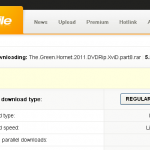Weekly News Roundup (13 February 2011)
Sorry for the slightly late edition of the WNR, couldn’t be helped unfortunately. Luckily, there weren’t too many news stories this week, especially if you really count the whole PS3 jailbreak saga as just one story, so hopefully we can get through this rather quickly.
And don’t forget our Facebook/Twitter competition where anyone who likes/follows will enter into the draw to win some $20 Amazon gift cards. The more likes/follows, the more prizes (up to 15 GCs – I have to save the rest of the website earnings for food), and from the current count, I should be handing out something like 7 or 8 of these GCs. So get clicking, and good luck!
 Let’s start with the copyright news. Last week. I talked about how increasing access to content reduces piracy, and if you take the same principle and use it for the other side, then decreasing access should lead to more piracy.
Let’s start with the copyright news. Last week. I talked about how increasing access to content reduces piracy, and if you take the same principle and use it for the other side, then decreasing access should lead to more piracy.
Which is exactly what experts are warning now that the UK has a new subscription channel that has made a lot of shows, previ0usly available on free-to-air TV, a channel exclusive. It means that for popular shows like Boardwalk Empire, the only way to actually watch these shows is to sign up to Sky Atlantic, or wait until the show hits DVDs/Blu-rays. Legally, that is. Illegally, well, you won’t really have to wait more than 2 hours after the original US airing date to find torrents posted everywhere for that particular episode. In fact, I bet that the torrent release schedule probably beats the airing schedule of Sky Atlantic, probably even by days or even weeks. So release windows, exclusive broadcasts, and no legal free option will only really drive people to pursue less than legal options. Those more adventurous (and technical minded) will go for torrents, while there are still plenty of file sharing and streaming sites that offer the rest the ability to watch the shows without the associated legal risk (since most of the legal focus is on BitTorrent downloads these days). Now, somebody will benefit financially from exclusivity and release delays, but it all seems very short term to me, and the reason why TV piracy is on the up. It’s more understandable for US cable based shows, that were never really on free-to-air anyway, but for shows that air in the US on the big networks, there’s no reason why these shows shouldn’t be shown simultaneously around the world (taking into account time zone differences). Do that, and I think piracy rates will be lowered by quite a bit. Yes, pirated shows don’t have ads, which is a big draw card, but with PVR/DVRs and a little bit of fast forwarding, it’s probably worth the pain to avoid the risk of receiving a letter from an opportunist law firm.
Speaking of file sharing sites like Hotfile, Hotfile has just been sued by the MPAA and five movie studios it represents. Now, I don’t think anyone can deny that there are lots of pirated files on Hotfile, but it is an upload service, and it’s the users that populate their servers. Like how people upload pirated Viacom clips to YouTube, and look how that turned out for Viacom, in the court room. The MPAA claims that Hotfile rewards users for uploading pirated movies and TV shows, because Hotfile has an affiliate program where you can earn movie depending on how popular your downloads are and how many of your downloaders sign up for the premium service. Now, I think it’s also fair to admit that many pirates are probably making money this way, but then again, in my line of work, I see a lot of software publishers that also use Hotfile and other file hosting services to save money on file hosting, as well as make a couple of bucks back. So Hotfile’s affiliate program really is just about growing their business and rewarding their customers, whomever they may be, and can you really blame a business for trying to do this? As for the ratio of legal to illegal downloads? I have no idea. But what can a company like Hotfile do to fight piracy, other than not exist (which is the MPAA’s preferred option – in fact, I think they’d rather the Internet not exist either, the same opinion also held by quite a few dictators around the world right now). They can try and filter based on file names, but all users will do is to name their downloads sdkj3489sd.zip or something similar, and piracy will continue. They can actively scan downloads, but pirates can then simply password protect and/or encrypt files (if they’re not doing it already), and piracy will continue. Hotfile can put in a system where copyright holders can submit removal requests, but they already have such a system which the MPAA studios appears to be not very fond of (mainly because it means they will actually have to do a bit of work themselves). So what’s a digital file locker hosting website to do? What can they do? They can get sued, apparently. And the likes of RapidShare and MegaUpload are surely not immune from similar lawsuits, although it’s understandable why the MPAA chose a lower profile website like Hotfile to sue, since it’s like RapidShare, which already has a lot of experience in the courts, will put up a much stronger fight.
6,500 people have been added to the “The Expendables” mass lawsuit. Nothing really surprising there, because as long as you have producers who don’t care about public opinion and a negative backlash, law firms like the US Copyright Group will continue to have clients.
The PS3 jailbreak stuff will be posted under the Gaming section as per usual.

In HD/3D news, again, not a lot happening. I did catch a few 3D Blu-ray titles on sales at Amazon and elsewhere online recently, and so even without Fox/Panasonic’s mean-hearted/short-sighted-ness in making Avatar 3D an exclusive (now selling for a little bit less on eBay, around $150).
The one I was tempted to buy was Piranha 3D. I loved the original Piranha movies, and this latest edition of the latest remake has both the 2D version, as well as the anaglyph version (red/blue glasses version), in addition to the 3D Blu-ray version, so it’s a good introductory package for 3D (because you can always go back to the 2D version in case 3D is not for you, or if you don’t have a 3D Blu-ray system right now, you can still enjoy the old fuzzy, washed out colours, style 3D with the cheap paper glasses).
While neither HD or 3D related, I did post a news item about publishers moving away from Apple’s iTunes towards Android and other more open marketplaces. While software restrictions are the real issue right now, it also I guess applies to movies, and some of these movies might be HD (I’m really stretching here, aren’t I). Basically, you have Apple who wants to control everything and then some, and it may be their right since they did produce the excellent iDevices in question, and most of their income is derived from having so much control. And there’s also the issue of quality control too. But being able to play any movie you want simply by using a USB cable to copying it, like you would do with any USB storage device, means that Android phones appeal to those who simply cannot stand iTunes or the idea of being locked to the software. And for publishers, it means they can publish without having to hand over 30% for every transaction, or to have to abide by Apple’s stupid licensing restrictions, which requires even free software have use Apple’s DRM (hence the whole VLC player for iOS debacle).
![]()
And finally in gaming, most of the news as you may have guessed relates to Sony’s legal action against the security researchers who uncovered the major security hole within Sony’s own security infrastructure, and famous/infamous PS3 hacker George Hotz, who did the awful thing is re-enabling homebrew on the PS3 (but not piracy).
The week started with Sony attempting to get the likes of YouTube and Twitter to hand over user information in relation to anyone remotely related to the PS3 hack, even those who simply watched the hacking video on YouTube. Their intention was to expand the case to include anyone who releases or distributes custom firmware and other security hacks. Basically, a fishing expedition. But one that was ultimately denied by the judge for the case.
I might have some sympathy for Sony if they only went after those that release firmware that included the ability to play copied games. But to go after fail0verflow, basically just a security research team, and also geohot, who has time and time again denounced piracy and went out of his way to ensure his custom firmware cannot play pirated games, it seems Sony have chosen the wrong targets really. And then to try and go after Linux hackers like Graf_Chokolo, whose sole aim was only to bring Linux back to the PS3, a feature that Sony once fully supported, it just seems unnecessary.
And then Linux community responded by fooling fake PS3 VP and twitter personality Kevin Butler into re-tweeting a hacked PS3 security code. Embarrassing, and even Xbox 360’s Major Nelson poked fun at the incident, but what’s more worrying for Sony is that all of these are taking attention away from the console and the great games that they will have out this year, and that’s something they can’t really afford at the moment, not when the race with the Xbox 360 is so close and with the threat from Kinect hanging around.
And speaking of Kinect, the PlayStation Move’s creator (Dr. Richard Marks) seems a bit jealous of the attention Kinect has gotten with the PC community, and wants something similar for the Move, except to make it even more accessible. I suppose this means that instead of having access to just the raw data, some of the software and processing algorithms may be opened up too, if Dr. Marks is able to overrule Sony’s “we don’t like anyone poking their heads under the hood” stance. Of course, what most interested the programmers was the potential of Kinect, and how different it was to any consumer tech on the market (something like this would otherwise be thousands and thousands of dollars, for the professionals market). The Move, while somewhat innovative, is really just a more accurate Wii, and programmers have already had their fun with hacking the Wii-mote when it first came out. If anything, the PlayStation Eye is a more interesting device, but one that still can’t compare to the Kinect in terms of innovation.
And so, we come to the end of another edition of the Weekly News Roundup. Enjoy your week!


